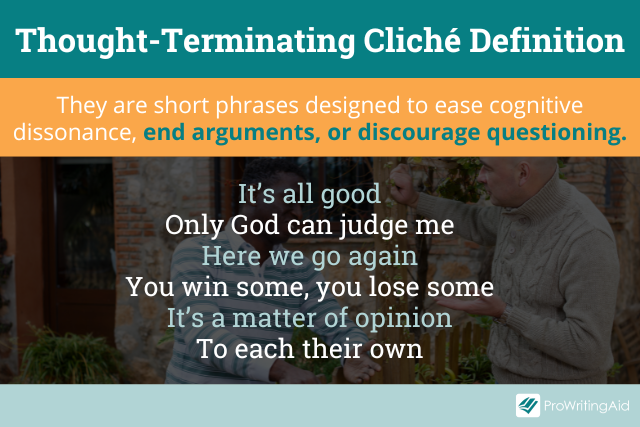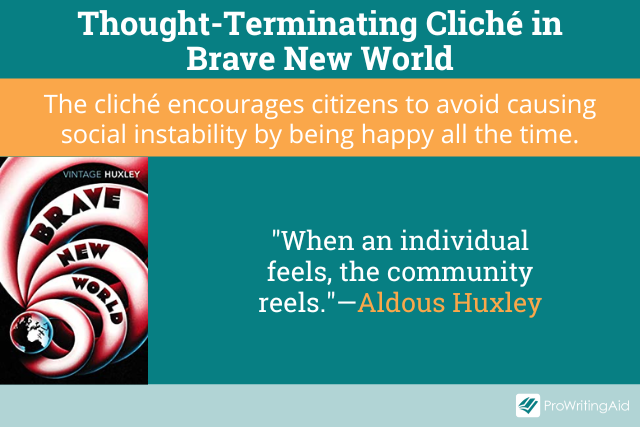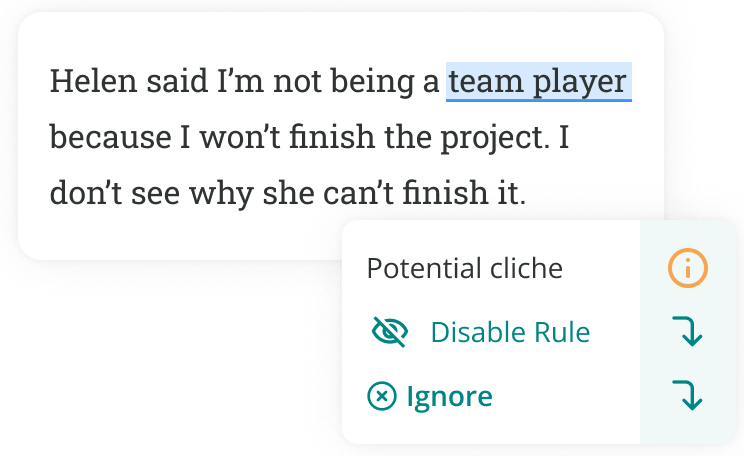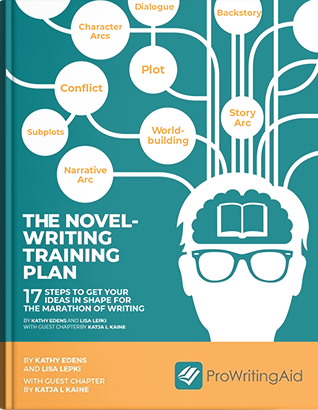
It is what it is.
We'll have to agree to disagree.
You only live once.
These sentences are all examples of thought terminating clichés. A thought terminating cliché is a short phrase meant to end discussion, debate, or questioning.
While some people use these phrases for insidious reasons, most people use them regularly without even realizing they are a type of loaded language.
Today, we'll take a deeper look at what a thought terminating cliché is, as well as several famous examples of these clichés.
What Is a Thought Terminating Cliché?
Thought terminating clichés are usually brief, easily memorized phrases with the intent of shutting down any dissent or questioning.
They are definitive-sounding phrases, which trick people into believing they are insightful or an answer to their hard question.

Often, these clichés masquerade as folk wisdom or religious mantras. But they are a type of loaded language and represent a fallacy in thinking.
A thought terminating cliché is designed to end any cognitive dissonance about a subject. This is when someone holds conflicting beliefs, which causes intellectual discomfort.
Here are some common examples of thought terminating clichés:
- It’s all good.
- Only God can judge me.
- Here we go again.
- You win some, you lose some.
- It’s a matter of opinion.
- To each their own.
- You’re not being a team player.
- You only live once.
- That’s just the way it is.
- That’s the way of the road.
- God has a plan.
- Life is unfair.
- To each his own.
- We will have to agree to disagree.
- That’s just your opinion.
- Rules are rules.
- It’s all relative.
- Boys will be boys.
A thought terminating cliché is usually a commonly used phrase. Oppressive governments and cults often use thought terminating clichés, but so do regular people.
It's often a quick, easy way to answer hard questions or end an argument when you don't know what else to say.
What Is Cliché Thinking?
Cliché thinking is the use of thought terminating clichés to shut down critical thinking. The phrase "thought terminating cliché" first appeared in 1961 during the height of the Red Scare.
Robert Jay Lifton coined the term in his book Thought Reform and the Psychology of Totalism. He described the language that the Communist Party of China (CPC) used as, "the start and end of any ideological analysis."
In other words, the Chinese government used phrases to prevent people from second-guessing the party's actions in order to discourage dissent or rebellion.
There are countless religious examples of thought terminating clichés as well.
Phrases such as "God moves in mysterious ways," provide people with a simple answer to difficult problems and unanswerable questions.
For some people, these clichés are comforting. But often, people wield them as a form of thought control against others.
Thought terminating clichés can be harmless. Saying, "It is what it is" when you have to pay a large fee for a required service isn't nefarious.
But saying, "That's the way things have always been" in response to a harmful law is dangerous.
Thought Terminating Cliché Examples
Once you are aware of thought terminating clichés, you'll hear them everywhere. Let's take a look at a few famous examples.
Thought Terminating Clichés in Literature
You can often find at least one thought terminating cliché in a dystopian novel. Aldous Huxley uses many in a Brave New World.
The citizens of the Utopia often repeat the mantra, "When an individual feels, the community reels." This encourages people not to express any emotions except happiness or else they'll cause social instability.

The government in the novel also provides a happiness drug called Soma. The citizens say, "A gramme is better than a damn," meaning it's better to take Soma than feel any emotions that aren’t happiness.
Thought Terminating Clichés in Television
The hit series Game of Thrones features many thought terminating clichés, including many of the house mottos.
These mottos are repeated frequently from the time a character is born as a way to inspire unquestioning family loyalty.
The House Tully motto is "Family, Duty, Honor," which shuts down any deviation in priorities. House Greyjoy says, "We do not sow," which is a way to explain that they do nothing but take with violence.
Likewise, the phrase uttered repeatedly by the Red Priestess Melisandre is a thought terminating cliché: "The night is dark and full of terrors."
It's a religious phrase that reminds people everything is terrifying without the light only the Red God can provide.
How to Avoid Thought Terminating Clichés
Avoid pithy, overused phrases that don't encourage questioning or debate. ProWritingAid can help you limit thought terminating clichés in your writing.
Our Clichés and Redundancies Report will highlight commonly used clichés, so you can find fresher ways to get your point across.

But a thought terminating cliché doesn't have to be a common phrase.
It's any short phrase meant to assuage cognitive dissonance, end arguments, or shut down difficult lines of questioning.
Look for these in your communities, in the news, and in your everyday conversations. You'll be surprised how often this form of loaded language shows up.


